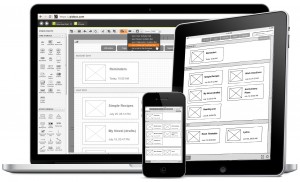Berlin-based startup presents novel software solution incorporating latest research results for simulating mobile apps at CeBIT 2014
BERLIN, FEBRUARY 28, 2014 – Berlin-based startup Pidoco GmbH will  present its latest software simulation for tablets and smartphones, which offers considerable cost savings in mobile app development, at this year’s CeBIT (March 10th-14th), the world’s largest IT trade fair. The software incorporates recent research results from proTACT, a research cooperation sponsored by the German government consisting of Pidoco, two universities and other industry partners, thus representing the state-of-the-art. Significant improvements have been made by integrating location-based data and device movements into Pidoco’s prototyping software, thereby enabling realistic simulations of mobile apps without the need for writing code. This makes it possible to verify whether design concepts meet producer and customer requirements and identify necessary corrections before embarking on costly development projects.
present its latest software simulation for tablets and smartphones, which offers considerable cost savings in mobile app development, at this year’s CeBIT (March 10th-14th), the world’s largest IT trade fair. The software incorporates recent research results from proTACT, a research cooperation sponsored by the German government consisting of Pidoco, two universities and other industry partners, thus representing the state-of-the-art. Significant improvements have been made by integrating location-based data and device movements into Pidoco’s prototyping software, thereby enabling realistic simulations of mobile apps without the need for writing code. This makes it possible to verify whether design concepts meet producer and customer requirements and identify necessary corrections before embarking on costly development projects.
Verifying whether a piece of software meets customer requirements is a challenge in software development and is usually only possible after completion of a project. At this point, necessary changes are significantly more expensive than duringdesign. Using prototypes to simulate apps enables developers to check whether customer needs are met even before implementation, including through tests with real users. This way significant cost savings can be achieved while optimizing the application’susability. During simulation, customers can see a draft version of the user interface and can interact with the prototype much like with the finished application.The new features, for the first time, allow for simulation of location-based apps and device movements in addition to touchgesture control, enablingPidoco to better cater to the growing mobile market. Pidocousers can now simulate location-based advertisements, for instance. Mobile travel guides featuring local site information, smart home applications reminding the user to turn off heating when leaving the building, rental car finder apps, or healthcare apps that issue quick emergency calls at the shake of the device, are other examples.
“With the new functions we are exploring the boundaries of what is feasible. Not only is it possible to simulate traditional touch gestures, but it is also possible to test reactions to changes in location or device movements by the user. A great advantage for our customers!”, says Philipp Huy, CEO of Pidoco. Easy handling was a key focus during development: Prototypes can be built using a construction kit approach without any programming skills. Pidoco’s server-based SaaS solution makes the simulations available on the mobile device in real-time. One-time download of the Pidoco App is the only prerequisite. You can meet Pidoco at CeBIT 2014, hall 6, booth L37.






